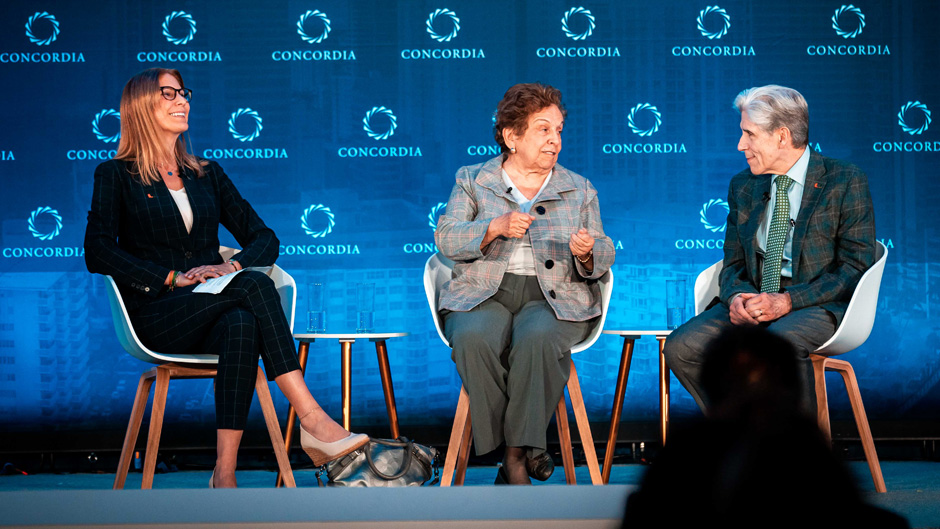In discussions on Friday addressing health care, trade, security, and economic vibrancy, Concordia panelists and speakers—public, nonprofit, and private sector leaders from around the Americas—urged the need to rethink existing models for health care, education, and supply chain management.
The panel discussions and presentations marked the second and concluding day of the 2023 Concordia Americas Summit, hosted for the second year by the University of Miami on its Coral Gables Campus as part of a multi-year partnership that extends through 2025.
Nicholas Logothetis, Concordia co-founder and chair of the board, celebrated the partnership with the University as an opportunity to engage students.
“This is an especially important time for the Western Hemisphere, and inclusivity lies at the heart of Concordia’s approach,” Logothetis said. “It’s critical to engage with students, to listen to exactly what issues are important to them and why, and to provide a platform. That voice is our next generation.”
In a discussion on pandemic-prompted disruptions to the health care system, Julio Frenk, University president and former Mexican health minister, and Donna E. Shalala, former U.S. Department of Health and Human Services secretary, former University president, and now a University faculty member, shared their insights. Karoline Mortensen, associate director of the Miami Herbert Business School Center for Health Management and Policy, moderated the conversation.
Frenk highlighted the potential of the globalized health care industry to address the “quantitative imbalance” of personnel shortages.
“Treating the system as a global market and allowing and enabling the movement of health professionals around the world offers enormous advantages,” Frenk said. “But it has to be done in a framework that is predictable and that doesn’t inordinately affect the poorer countries.”
Shalala agreed and emphasized that the process be managed systematically and with improved equity as an outcome.
“We need to look at the personnel shortage the same way we looked at the supply chain—beginning from the point of entry because we’re concerned about equity right down to when someone enters the job market,” Shalala said.
In terms of addressing the qualitative imbalance in the industry—especially influenced by education—Frenk urged a new conception of teamwork.
He noted that the health care industry will soon become the largest engine of employment in the world and as such will integrate many workers who are not health care professionals—managers, lawyers, computer specialists, and others. This cross pollination of workers, he said, will require trans-professional education that encompasses a rethinking of the education model.
In a panel exploring the impact of women in informal roles across society, Felicia Knaul, director of the University’s Institute for Advanced Study of the Americas and a public health specialist, highlighted the inequities in the health care system throughout the hemisphere—and the world—that undervalue and exploit women as the principal providers of that care and that undervalue the care economy itself.
“Seventy percent of all health care is provided by women, paid and unpaid, and women are underpaid and undervalued throughout,” said Knaul, referencing research published in The Lancet, a peer-reviewed medical journal. “We need to rethink this in order to build a model of universal health care that is not reliant on the exploitation of women as a way to get more and better health care.”
In her remarks, U.S. Trade Representative Katherine Tai said that trade should “champion the interests of everyday people” and that the current administration was intent on “seizing this moment of alignment” and pursuing more engagement throughout the Americas.
She noted the growing interest in “nearshoring,” or transferring business operations nearer to countries in preference to long-distance, as part of the redesign of supply chain management.
“When we look at the problems exposed by the pandemic—the vulnerabilities that were overconcentrated on reliance—we saw some supply chains that are extremely complicated and far-flung,” Tai said. “We want to think how to better use trade tools to modify supply and production, and the need to be, not just efficient, but also resilient.”
Justin Tellerio, a graduate student in the School of Architecture Master of Real Estate Development and Urbanism program, said he was motivated to attend to learn about the sustainability and environmental concerns in the region as they related to his studies.
Tellerio spent the day exchanging ideas with a group of six students from the Universidad de Panama, whose travel to the conference was supported by the Libra Group, one of the founding sponsors of the conference.
Guillermo Moreno, a first-year student majoring in communication studies, said the conference impressed on him the interconnectedness of the many sectors.
“Seeing how economic development, which feeds into education, which leads back into helping to create new jobs—and then we have the things that can delay investments and the influence of politics, Moreno said. “It makes you wonder: ‘Who are we getting money from? Where’s that money going? Can we have the civility to make these things happen?’ ”
On Thursday, Frenk moderated the session on “Climate Resilience’s ‘Ground Zero’: Miami Seas” and was joined by University experts Rodolphe el-Khoury, dean of the School of Architecture; Katherine Mach, professor with the Department of Environmental Science and Policy at the Rosenstiel School of Marine, Atmospheric, and Earth Science; Antonio Nanni, senior scholar professor at the College of Engineering; and Abigail Fleming, Mysun Foundation practitioner in residence at the Miami School of Law Environmental Justice Clinic.
In other opening-day sessions, several former Latin American presidents, current legislators, U.S. officials, and leading private and public-sector innovators debated challenges and innovations for climate change, misinformation, immigration, digital innovation, health care equity, and psychedelic medicine, among others.

